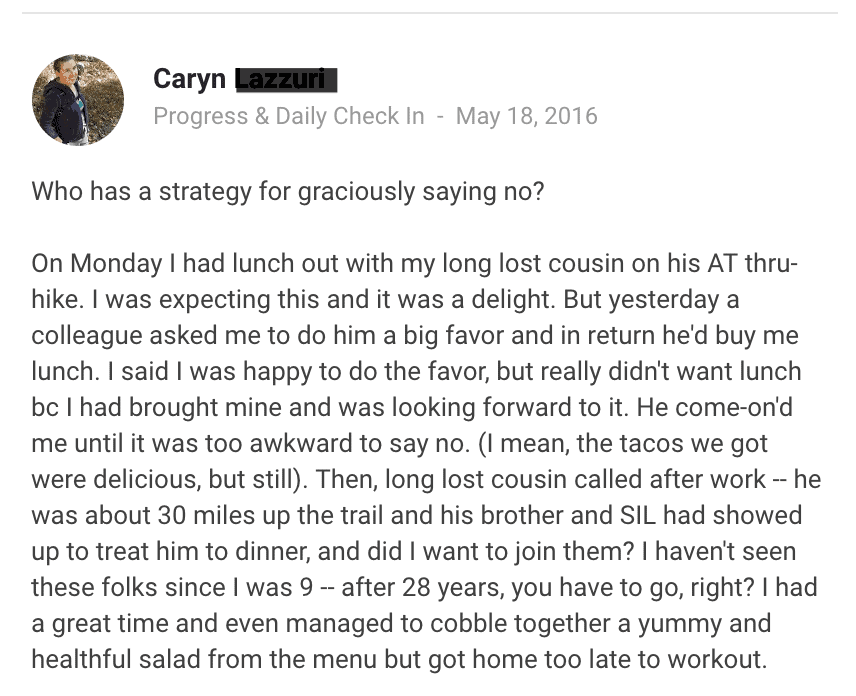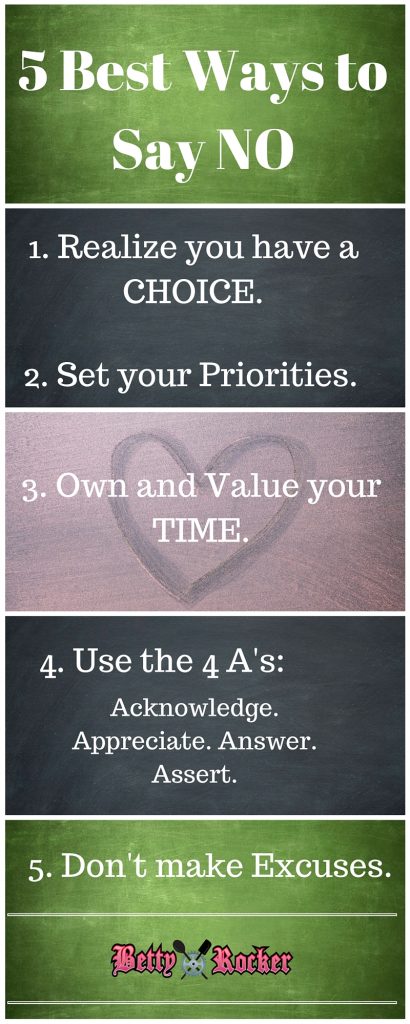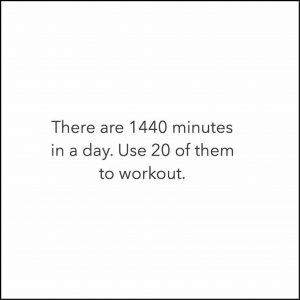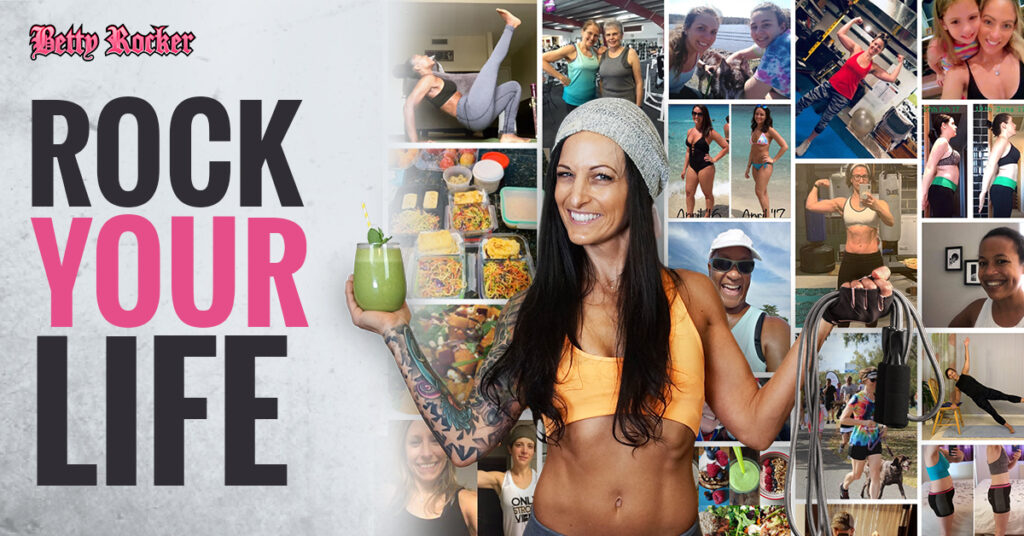Do you ever have a hard time saying no?
From food to family, healthy boundaries allow us the space to say no when we need to. They allow us to value our time and our health, and set our priorities so we can navigate to our goals.
But we all get into situations where saying no is tough.
Rock Your Life member Caryn L. had this question recently for the group – she got invited to eat a less-than-healthy lunch with a co-worker, and then invited to join friends for a late dinner later that same day which made her miss her workout – and suffer the consequences of food that didn’t sit well with her.
She talked about how challenging it was to say no in the first situation, how the co-worker had pressured her and made her feel awkward until she said yes.

It’s tough, isn’t it?
When we’re in social situations – especially around food, it IS awkward to be the one saying no.
Eating is an important opportunity to show our affinity for others, to bond and build trust and rapport. That’s why it’s almost impossible to say no to my grandmother when she’s offering me dessert!
But back to Caryn.
The second situation – the one where she got invited to eat with her friends late at night was one she would have said yes to under normal circumstances, as she wanted to catch up, but compounded with the situation from earlier in the day she was left feeling out of balance – with her eating, and with her choices.
I wanted to create a resource to help Caryn – and YOU if you’re ever in a situation like this – to be able to say NO, to hold your boundary.
Here are 5 strategies you can use to hold your boundaries.
5 Best Ways to Say No

While “yes” can sometimes feel like the only answer, remember – you always have a choice.
Sometimes we just need a way to say no that doesn’t hurt the other person’s feelings – since a lot of the time we say yes because we’re afraid of how someone else will feel if we say no.
One of my best strategies for this is to remember: that saying yes when you can’t really be fully present or give 100% to what is being asked of you should be no.
Letting the other person know that you value them enough to want to be able to give them your regard and attention is still a no, but it’s one that displays your respect for them – and of course yourself.
When it comes to the choices we make that don’t involve anyone but ourselves, say for instance with food – the best way to make a choice is to know WHY you have one.
Educating yourself about the nutrients and how they work in your body is one of the most worthwhile activities you can spend time on – because the more you know and understand about how it works, the easier it becomes to make mindful choices about nourishing yourself.
This doesn’t mean you have to say no to dessert every time, either! Choosing your yes and no with intention and not simply guessing – is the most empowering way to enjoy all the things you eat.
That’s exactly why I teach a concept called “NSA” or “no strings attached” when it comes to your treats – because I think you should suspend judgement of yourself and be able to enjoy a balanced approach to eating that doesn’t involve guilt or shame.
When you know WHY, you can choose HOW you do things on purpose – you can say yes or no from a position of power rather than being driven by uncertainty or fear. An informed choice is the best way to make a choice.
2. Set Your Priorities.
Give yourself permission to decide what the most important things in your life are and then take action on them.
Saying NO to some things gives you space to say YES to other things (or people) that are more important. That’s why it’s so vital that you get really clear on what your priorities are.
When you’re presented with an option that derails you from being in integrity with what matters to you and you say yes, you create internal stress and guilt that lessens your ability to be present, enjoy the experience and can undermine your goals.
Jim Rohn said, “You are the average of the 5 people you spend the most time around.” Surround yourself with other people who have similar priorities. It makes it a lot easier to hold your boundaries when you can benchmark off others.
For me, my health is a major priority. So I’ve spent a lot of time learning about ways I can live a very healthy lifestyle. One of my top priorities, for example, is getting quality sleep. This priority helps me in social situations where I might be tempted to have poor boundaries – like “one more drink.” It helps me avoid having too many late nights – staying up watching a movie or going out multiple times a week with friends. As a result, I get great sleep – and I still enjoy staying up late some nights – but not every night.
I’m sure you can think of more examples where your healthy lifestyle priorities help you make better choices. That matters. Keep it up!

You are entitled to the time that you have allocated for rest, for fun, for your workout, for personal things – don’t let someone bully you into giving that up.
Once you’ve named your priorities, being in a situation where you’re afraid to say no gets a bit easier – because you’re choosing to take ownership of the valuable time you’ve set aside for taking care of you.
Remembering you have a choice, and that one of your choices is doing the things you want to do for yourself.
Remember our friend Caryn?
One of her priorities is getting really healthy this year, and eating nutrient-dense food is a big part of that. She had packed her own lunch to take to work from one of my meal plans – which she’d spent time and money shopping for and spent time preparing.
But she ended up not eating her nourishing lunch and instead having street food that didn’t sit well with her – because she didn’t say no to her co-worker. In situations like that when we haven’t shored up our boundary-setting tactics, it’s easy to let someone else’s needs override ours.
And you don’t need to make excuses about why you say no (see 5) but you do need a good dose of this next step…
4. Use the 4 A’s: Acknowledge, Answer, Appreciate and be Assertive.
When I first started training my team, I realized that there were 3 main things we needed to do in every interaction we had with the people we talked to.
Acknowledge. Answer. Appreciate.
If we could get at least two out of three in every interaction, we were doing a great job. To me, communication is about acknowledging how another person feels, letting them know I appreciate it (whether or not I agree or can help), and answering if I can. Sometimes my answer is that I don’t have the answer and sometimes my answer is no.
When I was thinking about boundaries and how I hold them in my life I realized that I say no with the 3 A’s we use in our customer service communication but I also add assertion to my response.
Assertion is not aggression. It is not dogma. It is not righteousness. It is a belief in your truth that allows you to hold your ground with composure and poise. Give yourself permission to have this – it is a kind of gentle armor that will carry you far.
Something that happens all the time to me as Betty Rocker are companies (people) who try to give me free products so that I will tell my readers about them, or companies who reach out to me offering to pay me to promote their products. No amount of money or free stuff is going to make me promote something I don’t use myself so I have to say “no” a lot.
These companies are people, so my approach in these situations is to always appreciate the energy in the offer. I appreciate that these people respect my opinion and my brand enough to ask me. I appreciate the effort that goes into creating new products. Getting things out into the marketplace is sometimes the best test of their quality and usefulness, and I acknowledge that effort and respect the work.
When my answer is no, it is always with gratitude. It is also strong. If someone wants to know “why” I tell them. “I wouldn’t use this product, so I cannot tell my people about it with integrity.” If they want to know “why wouldn’t you use it” I might tell them that the ingredients aren’t optimal for health, or that the design makes their product hard to use, or that I already use a similar product I like more.
I never shirk from being honest, but I always offer feedback/no with love – and you can too.
Are you thinking about how Caryn could have said no to her co-worker using the 4 A’s? I was just thinking about an example, something like, “Thank you so much for that invitation! I’d love to have lunch with you, but not today. How about tomorrow?”
Acknowledgment: Thank you for the invitation!
Appreciation: I’d love to have lunch with you….
Answer: ….but not today.
Assertion: …but not today. How about tomorrow?
This last bit is a great technique – you can offer an alternative time that works better for you.
In some situations, you can stall for time so you feel less pressured to make a decision – for example saying, “let me sleep on it” means you will consider the request but will take your own space to sort out your answer.
It’s going to be easier to hold your ground when you’ve had a chance to step back and think about your priorities and choices. Of course, it would be a little odd to respond to a lunch request with “let me sleep on it,” but there are plenty of situations where that would be perfectly appropriate.
5. Don’t Make Excuses.
Do you know anyone who constantly makes excuses? Perhaps you find yourself doing this. If you’re anything like me (a people-pleaser) it’s such an easy mistake to make around boundary setting.
Making excuses is not a strong play. It’s really a smokescreen that conveys to another person that you “might” be available. We’re trying to defend our position for saying no, but really you don’t need to do this.
It’s a wide-open door for people to push back against. Our helpful fellow humans are problem solvers, solution creators and want to help you figure out what to do – so when you make excuses for why you can’t say yes, expect suggestions for how to deal with your excuses so that you can.
Remember…you don’t have to please everyone.
I know for myself, a lot of my old excuses came from this desire not to let anyone down, so I would want to make an excuse so I could feel better about saying no.
But it IS ok to say no.
Use the 4 A’s, remember you have a choice and set your priorities! You are the author of your life – own and value your time so you can write the story you want to go back and read.
Comment below and let me know how you set your healthy boundaries, and where you struggle with them – it’s so helpful when we can learn from each other!
Join my online fitness community, Rock Your Life and be a part of the discussions that have just as much impact on our lives as our workouts.
